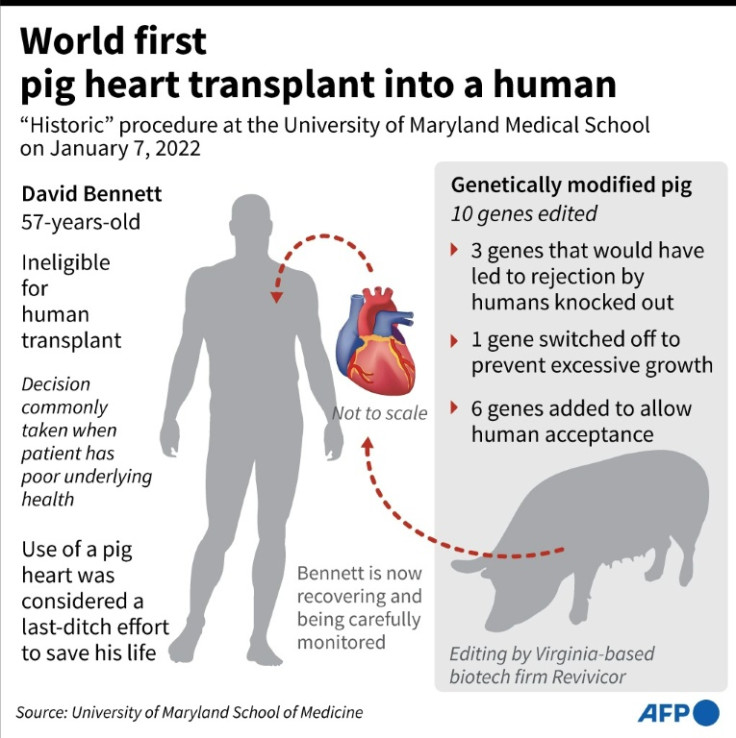Second Man To Receive Pig Heart Transplant Dies 40 Days After Surgery
Similar surgeries have been unsuccessful in the past because the human body rapidly rejects animal organs.

The second living person in the world to receive a genetically modified pig heart has died 40 days after the experimental surgery. The man, identified as 58-year-old Lawrence Faucette, underwent the surgery on September 20 earlier this year. He passed away on Monday.
The procedure was carried out by the surgeons at the University of Maryland Medical School after they were given a special dispensation by the US medical regulator, per CNN.
According to doctors, the heart seemed healthy for the first month, but it eventually began to show signs of rejection. Faucette, who was ineligible for a human transplant, had said: "My only real hope left is to go with the pig heart, the xenotransplant."
A statement released by the hospital read: "Mr. Faucette had made significant progress after his surgery, engaging in physical therapy, spending time with family members, and playing cards with his wife, Ann.
"In recent days, his heart began to show initial signs of rejection --the most significant challenge with traditional transplants involving human organs as well. Despite the medical team's greatest efforts, Mr. Faucette ultimately succumbed on October 30," it added.
Faucette was a Navy veteran and retired lab technician at the National Institutes of Health. He was not eligible for a traditional heart transplant because of other health problems.
Similar surgeries have been unsuccessful in the past because the human body rapidly rejects animal organs and starts killing the organ within minutes.
Using pig heart valves on humans is already common, and their skin is grafted on human burn victims. Pigs make ideal donors because of their size, rapid growth, and large litter.
The second person to receive a transplanted heart from a pig has died, his doctors announced.https://t.co/TQIKCWDztN
— KTLA (@KTLA) November 1, 2023
Last year, a 31-year-old woman who had been suffering from a congenital heart defect finally got her pig and cow heart valves replaced with human ones.
The pig valve had begun to fail within a few years. The pig valve was replaced with a cow's. Shortly after, the cow valve also failed, and Cairney had to be admitted to the emergency room of a local hospital last year. She was finally able to lead a normal life due to a donor's generosity.
The first person to receive a heart transplant from a genetically modified pig passed away two months after the surgery.
US-based David Bennett underwent the surgery on January 7 last year. This surgery was also carried out by the surgeons at the University of Maryland Medical School. The doctors had then said that Bennett had been able to spend time with his family after the surgery and even watched the Super Bowl, but his condition started deteriorating eventually.
"He proved to be a brave and noble patient who fought all the way to the end," said surgeon Bartley Griffith, who performed the transplant.
In David Bennett's case, the pig whose heart was used for the transplant had undergone gene editing. The genes responsible for organ rejection had been removed.
"We have gained invaluable insights learning that the genetically modified pig heart can function well within the human body while the immune system is adequately suppressed," Muhammad Mohiuddin, director of the university's cardiac xenotransplantation program, had said then. "We remain optimistic and plan on continuing our work in future clinical trials."
Earlier this year, a team of German scientists found a way to develop the first-ever 0.5-millimetre-sized heart in a petri dish.
The breakthrough discovery will pave the way for future research on the developments of the human heart. These new insights may also lead to discoveries of why fetal hearts have the capability to repair themselves while adult human hearts generally cannot.
This knowledge could also aid in research pertaining to new treatments for heart attacks and other types of conditions, as well as investigations on the different illnesses of individual patients.
© Copyright IBTimes 2025. All rights reserved.






















